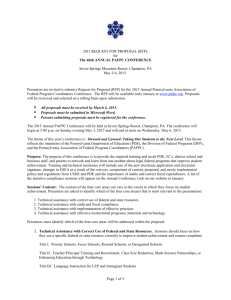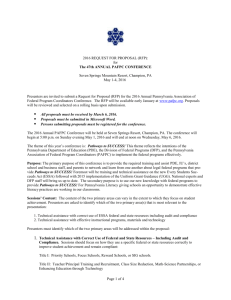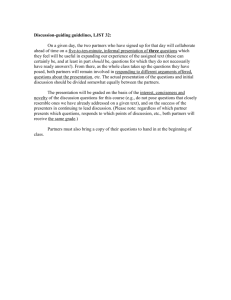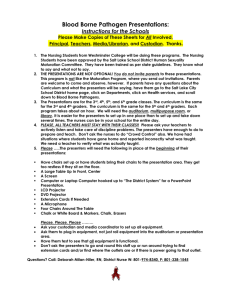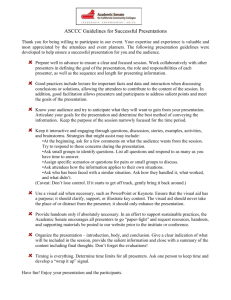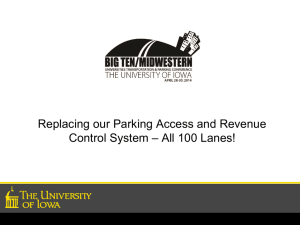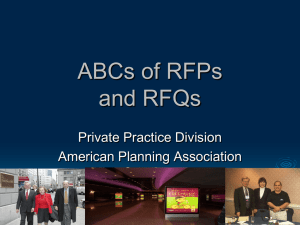Wednesday - PA Association of Federal Program Coordinators
advertisement
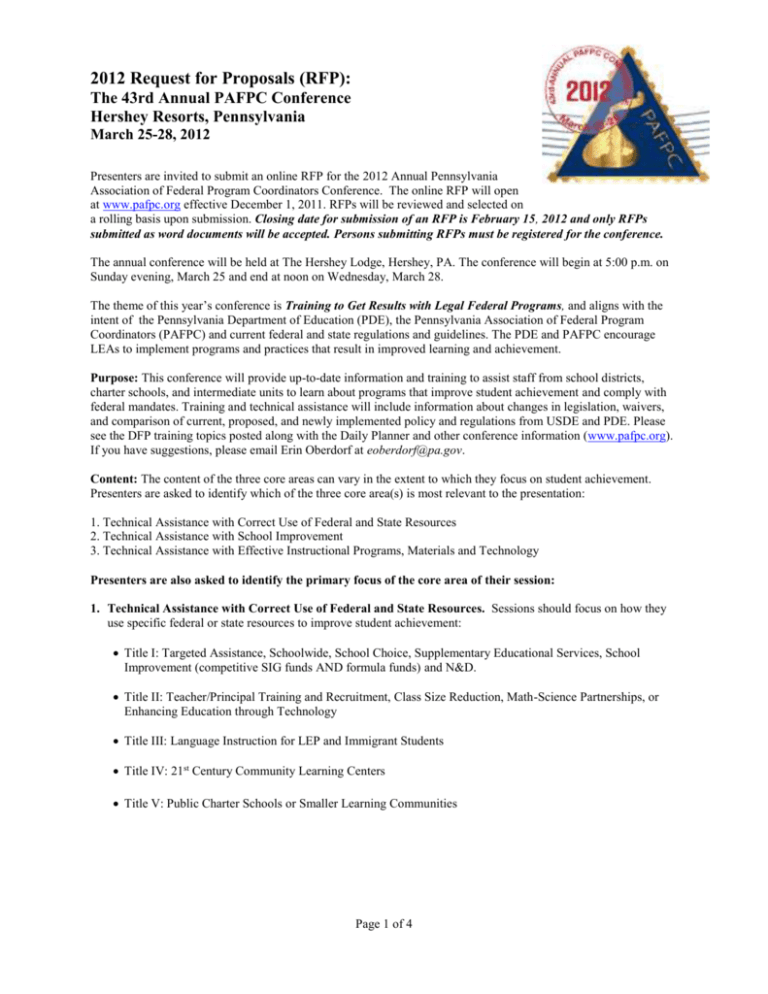
2012 Request for Proposals (RFP): The 43rd Annual PAFPC Conference Hershey Resorts, Pennsylvania March 25-28, 2012 Presenters are invited to submit an online RFP for the 2012 Annual Pennsylvania Association of Federal Program Coordinators Conference. The online RFP will open at www.pafpc.org effective December 1, 2011. RFPs will be reviewed and selected on a rolling basis upon submission. Closing date for submission of an RFP is February 15, 2012 and only RFPs submitted as word documents will be accepted. Persons submitting RFPs must be registered for the conference. The annual conference will be held at The Hershey Lodge, Hershey, PA. The conference will begin at 5:00 p.m. on Sunday evening, March 25 and end at noon on Wednesday, March 28. The theme of this year’s conference is Training to Get Results with Legal Federal Programs, and aligns with the intent of the Pennsylvania Department of Education (PDE), the Pennsylvania Association of Federal Program Coordinators (PAFPC) and current federal and state regulations and guidelines. The PDE and PAFPC encourage LEAs to implement programs and practices that result in improved learning and achievement. Purpose: This conference will provide up-to-date information and training to assist staff from school districts, charter schools, and intermediate units to learn about programs that improve student achievement and comply with federal mandates. Training and technical assistance will include information about changes in legislation, waivers, and comparison of current, proposed, and newly implemented policy and regulations from USDE and PDE. Please see the DFP training topics posted along with the Daily Planner and other conference information (www.pafpc.org). If you have suggestions, please email Erin Oberdorf at eoberdorf@pa.gov. Content: The content of the three core areas can vary in the extent to which they focus on student achievement. Presenters are asked to identify which of the three core area(s) is most relevant to the presentation: 1. Technical Assistance with Correct Use of Federal and State Resources 2. Technical Assistance with School Improvement 3. Technical Assistance with Effective Instructional Programs, Materials and Technology Presenters are also asked to identify the primary focus of the core area of their session: 1. Technical Assistance with Correct Use of Federal and State Resources. Sessions should focus on how they use specific federal or state resources to improve student achievement: Title I: Targeted Assistance, Schoolwide, School Choice, Supplementary Educational Services, School Improvement (competitive SIG funds AND formula funds) and N&D. Title II: Teacher/Principal Training and Recruitment, Class Size Reduction, Math-Science Partnerships, or Enhancing Education through Technology Title III: Language Instruction for LEP and Immigrant Students Title IV: 21st Century Community Learning Centers Title V: Public Charter Schools or Smaller Learning Communities Page 1 of 4 2. Technical Assistance with School Improvement. Sessions should emphasize school improvement efforts that positively affect student learning and achievement relative to academic standards. Presenters should share challenges faced and the ways in which they overcame those challenges. Presenters should share successes and challenges they met in implementing their plan, which include: The use of data to identify particular strengths and weakness in student performance. The identification of possible explanations/causes of those strengths and weaknesses in student performance and the role data played in that process. Also, identify the extent to which the explanations/causes are rooted in: specific school programs and related materials particular instructional practices the kinds of supplementary interventions and supports provided students the quality of the environment and climate the school provided for learning. The identification of the strategies that would address the identified explanations/causes. The implementation of those strategies, including the quality of professional development that helped staff achieve success. The monitoring of the implementation of the strategies. The evaluation of the effects on student achievement and the use the resulting information to help them strengthen their improvement effort. 3. Technical Assistance with Effective Instructional Programs and Materials, and Technology. Sessions should focus on specific programs in reading, math, ELL, early childhood, etc. that have improved student achievement and DISTINGUISHED their programs or techniques from other schools. Page 2 of 4 REQUEST FOR PROPOSAL PAFPC ANNUAL CONFERENCE 2012 REQUIRED FORMAT FOR A SESSION DESCRIPTION 1. Applicable Content: Please check the core area that best describes your presentation: Technical Assistance with Correct Use of Federal and State Resources Technical Assistance with School Improvement Technical Assistance with Effective Instructional Programs, Materials and/or Technology 2. Session Title: 3. Session Leader: Name: Title: Organization: Phone: e-mail: Session Co-Presenters: Name: Title: Organization: Phone: e-mail: Name: Title: Organization: Phone: e-mail: Name: Title: Organization: Phone: e-mail: Name: Title: Organization: Phone: e-mail: Page 3 of 4 Name: Title: Organization: Phone: e-mail: Name: Title: Organization: Phone: e-mail: Name: Title: Organization: Phone: e-mail: 4. Session Description: In 75 words or less provide a description of your proposed session. This description will appear in the program should it be selected. 5. Presentation Times (check all times that you will be available to present) Monday, March 26, 2012 a.m. p.m. Tuesday, March 27, 2012 a.m. p.m. Wednesday, March 28, 2012 a.m. 6. Length of Session: (check one) One hour Two hour *NOTE: There are a limited number of 2 hour session available. Those wanting a 2 hour session spot will be scheduled on the days/times available on a first-come, first-serve basis. 7. Preference with respect to room capacity: (check one) 180-person room 90-person room 8. Evaluation Description: In 75 words or less provide a description of how you evaluated the content of your proposed session. 9. Registration and Reservations: Presenters are responsible for the cost of their conference registration and hotel arrangements. Presenters must be registered to submit an RFP. RFPs will be reviewed and approved on a rolling basis as they are received. 10. Email the RFP word document to: jmsheffer@aol.com; virginia_moore@miu4.k12.pa.us, and eoberdorf@pa.gov. Page 4 of 4
